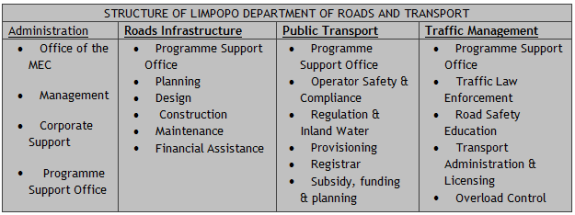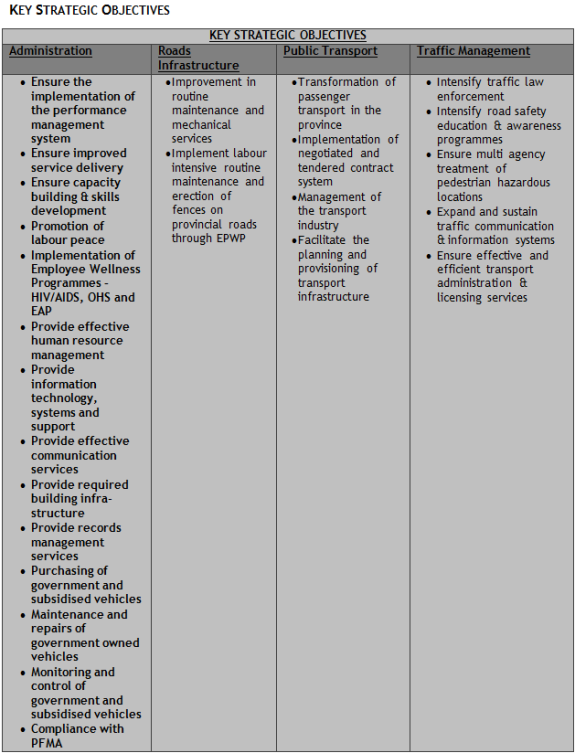Vision
Quality transport infrastructure and services for all.
Mission
To provide safe, sustainable and integrated transport infrastructure and services for the promotion of socio-economic development.
Values
- Integrity
- Transparency
- Accountability
Responsibility
The Limpopo Department of Roads and Transport (LDRT) is responsible for public transport, traffic management and law enforcement and roads and maintenance.


Programme Overview
The department consists of five programmes:
- Administration
- Directorate: Financial Services
- Directorate: Corporate Support
- Directorate: Government Information Technology Office (GITO)
- Directorate: Internal Support
The core transport programmes are:
- Transport Infrastructure
- Transport Operations
- Transport Regulations
- Community Based Pogramme
Programme: Transport Infrastructure
The Directorate focuses on the maintenance of roads and roads related infrastructure. It is aimed at facilitating the economic development of the province and its people and to supply safe roads and roads related infrastructure. The Chief Directorate is also responsible for the implementation of the EPWP programme which aimed at short term job creation and skills development of community members by implementing learnership contracts and developing Small Medium and Macro Enterprises (SMME's)
Programme: Transport Operations
The Directorate mainly focuses on provision of public transport in Limpopo province. It further ensures that there is compliance and that the public transport industry is properly regulated. The Directorate also facilitates transport infra-structure research and planning in line with the Integrated Development Plans (IDP's) of municipalities. The Chief Directorate further promotes non-motorised transport through their bicycle and donkey cart projects.
Public, Freight & Air TransportThe main aim of this sub directorate is to plan, develop, regulate, and facilitate the provision of public, freight and air transport services and infrastructure through provincial resources and co-operation with national and local authorities as well as the private sector in order to enhance the mobility of all communities, particularly those currently without or with limited access.
- The department identified the following areas in terms of needs: Giyani, Polokwane, Jane Furse, Burgersfort, Makhado, Thohoyandou and Northam
- Public transport and freight infrastructure relates to the facilities for modes that are utilized by the passenger for rewards/payment like bus stations, taxi ranks, rail stations and airports including for non-motorized transport like bicycles and animals (animal drawn carts). Freight infrastructure is more on the logistic facilities like transfer facilities which could be incorporated into Intermodal Facilities and rail infrastructure; the cross-border facilities in terms of ensuring speedy transit, and developing certain freight high volume corridors to enhance freight mobility and or shorten distances between commodities/producers and markets.
- Public transport infrastructure is in high demand throughout the province
- Current infrastructure is old, not integrated and not user friendly; relatively far from passengers particularly switching from one mode to the other where passengers take longer time; the present infrastructure does not encourage long operation hours and thereby limiting business hours; it is abundantly managed by operators and prone to bias and promotes conflicts. Rural areas are hardest hit on this challenge. The chief directorate have prioritised main economic centers in all districts for development of Intermodal Facilities to respond to this. Which is Giyani, Polokwane, Jane Furse, Burgersfort, Makhado, Thohoyandou and Northam
- In terms of freight, the road infrastructure is inadequate to carry the heavy loads. There is a need to transfer some freight to rail or air. Traffic congestions delay freight transportation and some commodities lose value along the way e.g., farm produces while the time taken on the movement of goods generally determines the cost. The issue of infrastructure is also linked to the entire transport system which should be complementary and provide modal choice and preference hence the need for rail development as well.
Programme: Transport Regulations
The Chief Directorate is responsible for the provisioning of traffic control and traffic policing, road safety education and awareness, transport administration and licensing and traffic training services in Limpopo province. The aim of the Chief Directorate is to reduce road traffic accidents and injuries through intensified road safety education and law enforcement programmes and to regulate driving and vehicle licences in Limpopo province. The Chief Directorate also focuses on overloading control to protect the road infra-structure, not only of the province but the whole country. Traffic Training is done by the Manenu Traffic Training College. Traffic control, traffic policing, overload control and road safety education and awareness services are rendered by the five operational districts of the department. Traffic control, traffic policing and overload control services are rendered by Traffic Stations and Traffic Control Centres in the different districts.
Programme: Community Based Programmes
The purpose of this programme is to manage the implementation of programmes and strategies that lead to the development and empowerment of communities and contractors.
The department has 2 agencies namely:
Both these agencies are funded by the department and are accountable to the MEC in terms of delivering services according to their mandate. The agencies are fully functional entities and work in line with the departments key strategic objectives.
Limpopo Provincial Govt through the office of the MEC of Roads and Transport (together with LDoRT) is responsible for coordinating the full spectrum of transport planning initiatives taking place in the province. This is particularly important as it promotes public transport and modal integration;
Roads are managed and maintained by:
- South African National Roads Agency (SANRAL)
- Road Traffic Management Corperation (RTMC)
- Road Traffic Infringement Agency (RTIA)
- Road Accident Fund (RAF)
- Road Agency Limpopo (RAL)
- Limpopo Department of Roads and Transport (LDoRT)
- District Municipalities (DM's)
SANRAL, RAL & DM's look after their own mandated sections of the road network. LDoRT is the overarching transport authority in the Province and reports to the MEC of Roads and Transport;
Gateway Airport Authority Ltd (GAAL) manage Polokwane International Airport. GAAL is wholly owned and was setup by Limpopo Provincial Govt i.t.o provisions of the Companies Act, 1973 (Act 61 of 1973) and the Public Finance Management Act, 1999 (Act 1 of 1999);
GAAL has also taken responsibility of domestic airports in Limpopo;
Spoornet is responsible for the rail network
Freight Transport Institutional Challenges & Issues
- Address long term transport infrastructure financing and sustainability challenges
- Avoid ad-hoc and reactive transport infrastructure investment
- Better manage and handle mega projects in transport infrastructure
Freight Transport Institutional Proposed solutions
Transport Investment Clearing House (TICH)
- Proposed focus:
- Assist, support and advise transport structures in developing proposals for funding of "mega transport infrastructure projects".
- Evaluation of alternative modal proposals to the transport problem to be addressed in order to determine the most appropriate proposal to advance.
- Formulation of transport investment proposals for the National Planning Commission to prioritise for funding.
- Proposed Institutional Process:
- Create a small highly specialised and professional team of transport investment project experts in modal areas [Is the current PMU the solution].
- Create new provincial funds that are dedicated to the provision of provincial transport infrastructure.
- Create a new Rail Infrastructure Agency
Proposed Solution is Department of Transport - Multimodal Policy Forum
- Proposed focus:
- Develop policy on roles, responsibilities and boundaries of the "playing fields" of the different modes.
- Give guidance to the different modes to understand their "playing fields" and allow the modes to develop operational policy and strategy.
- Ensure overarching alignment of modes in a multimodal transport environment.
- Ensure multimodal policy support to inter alia land-use and environmental issues.
- Proposed Institutional Process:
- Use the current policy instruments inside the DOT to source appropriate skills for the Multimodal Policy Forum.
- Ensure that the focus is on modal strengths in a multimodal environment to guide "playing fields".
- Ensure legislative support and compliance.
District wide Freight Transport Challenges and Gaps
- Lack of freight units at District and Municipal Level
- Poor articulation of freight issues at local level
- Freight transport issues treated as an after-math or appendage or window dresser item when Province and National Level call
Proposed Solution
- Sharpening and strengthening Freight Transport Unit at Provincial Level
- Establishing Provincial Capacity Building Freight Developmental Clusters
- More explicit Provincial Freight Vision
- More Explicit Provincial Freight Mission
- Provincial Freight Charter
Copyright © 2012 Limpopo Province Freight Transport Data Bank | Developed and Powered by Safiri South Africa.







